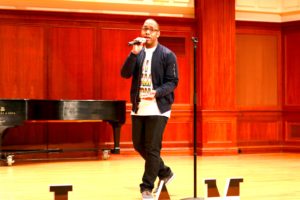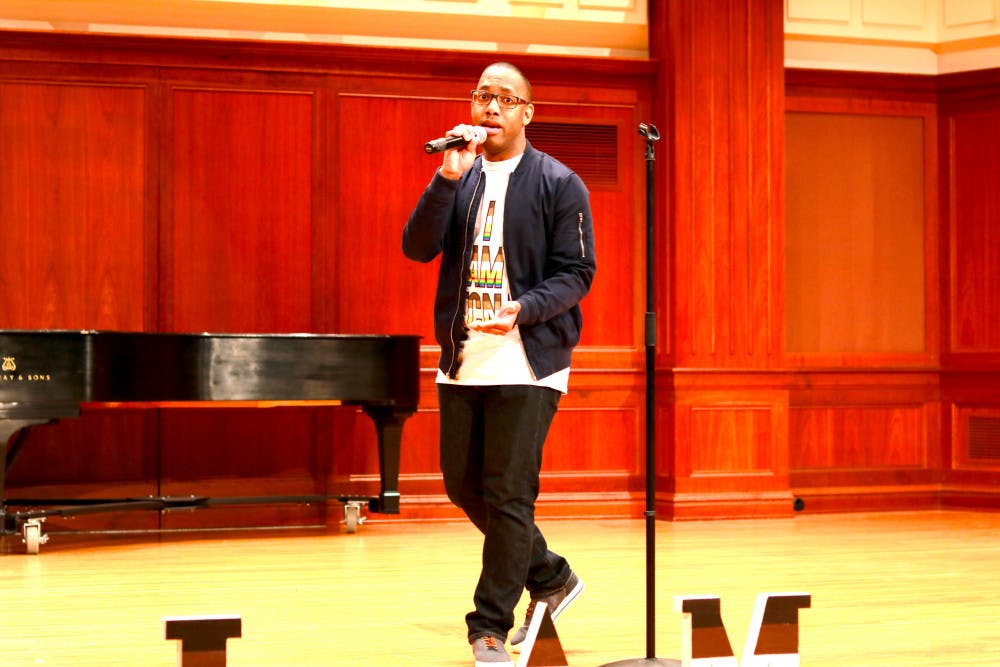By Miguel Gonzalez
Photo Editor

As part of Student Government’s Diversity and Inclusion week, the Office of Institutional Diversity, Equity and Inclusion hosted its second annual #IAMTCNJ monologues at 8 p.m. in Mayo Concert Hall on Thursday, April 11.
Eashwayne Haughton, a senior philosophy major and SG vice president of diversity and inclusion, spoke in between monologues as students and administrators shared their perspectives on both the college and their personal identities.
Senior nursing major Joseph Ballesteros, who also spoke last year, spoke up again about his background. Ballesteros said that as someone who grew up Filipino, he has dealt with being called a “dog-eater” during his freshman year living in Centennial Hall. During his time at the College, Ballesteros found support through TCNJ Barkada, the campus organization that represents Filipino-Americans on campus.
“I’ve learned to tolerate the micro and macro aggressions I face here,” Ballesteros said. “I am who I am. I have found people who are strong as I am.”
Another memorable monologue came from Bianca Cherubin, a freshman psychology major, who spoke about her pride as an African-American woman.
“My blackness, this sh*t is magical,” Cherubin said. “Did you all see my skin? This sh*t is beautiful. My blackness is what makes my skin tough.”
Cherubin spoke about the lasting effect of the derogatory term, n*****. A word she claims she and her ancestors have been called.
“N*****, if I have to hear it, you all have to hear it as well,” Cherubin said. “Speaks light and tongue.”
Cherubin concluded her monologue by asking students what blackness meant to them. Some said that it meant they had ambition, beauty and pride.
Acting Vice President for Diversity, Equity and Inclusion Ivonne Cruz followed by speaking about her journey from being a student at what was then Trenton State College to rising to her current position. Cruz insists that her 29 years at the College has helped make it her second home.
Initially, Cruz had difficulty adjusting to Trenton State as a first-generation college student in part because it was harder for her to communicate with her parents as much as she would have liked.
“No cell phones, no emails,” Cruz said. “There was a phone at the end of the hallway if I was lucky. I timed it right and (got) my parents to call.”
In her time as an undergraduate at Trenton State, Cruz found support by joining Union Latina and the Minority Mentoring program, a precursor to the College’s current PRIDE Mentoring Program.
In her current position, Cruz strives to be a mentor and create an inclusive student community.
“I am privileged to be in this role,” Cruz said. “This is a new direction we are going in. I take this position seriously because this place is home. This is personal to me. It’s not about getting titles, credit or money.”
College President Kathryn Foster took the stage and emphasized the perspectives she brings to the College. Foster first explained different life experiences, or lack thereof, that help formed her present identity. She talked about her experience not being a mother or a military veteran.
She further announced that she was not a bible believer and how she has not brought religion and spirituality to their life. She also admitted she has never worked a job that involved punching a time clock.
Foster said that her experiences with diversity –– she served as a Peace Corp volunteer in Swaziland –– and her experience as a kidney donor also helped her become the person she is today.
As a Peace Corps volunteer for two years, Foster had immersed herself in a new culture.
“You are the other,” Foster said. “You are the visitor. You are the person that’s not like anyone else. And that has been an incredible experience for me as a person grown with a lot of privilege.”
At the same time, because of her minority status there, Foster felt looked down upon as a young white woman in Swaziland. Despite those hardships, Foster said her experience has made her a better teacher, scholar and leader.
“For two years, I experienced what it felt like to be stereotyped and thought of poorly,” Foster said. “What it felt like to not be listened to. What it felt like to be treated (like), ‘oh, you’re just a woman.’”
Ten years ago, one of Foster’s close friends fell ill, which is when she decided to donate her kidney. After going through physical and mental tests, Foster learned her kidney was a match. On March 23, 2009, Foster became a kidney donor, and although her friend eventually died, she is grateful to have helped someone in need.
“I can go through the rest of my life knowing I did something for someone,” Foster said. “It was probably the best thing I’ve done in my life.”







